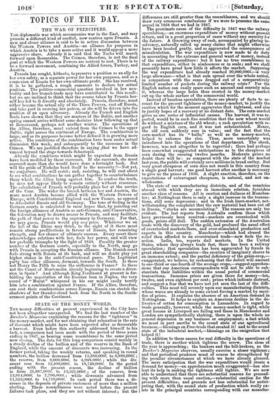TOPICS OF THE DAY.
THE WAR OF PRINCIPLES.
Tits diplomatic war which accompanies war in the East, and may precede a different kind of conflict, now centres upon Prussia. A new and closer alliance is said to be in active discussion between the Western Powers and Austria—an alliance for purposes in which Austria is to take a more active and it would appear a more aggressive share. Already it is said that the Turks will march forward upon Bessarabia. The Crimea, therefore, is not the final goal at which the Western Powers are content to rest. There is to be a forward movement, combining the Allied forces, Turkey, and Anstria. Prussia has sought, hitherto, to preserve a position as an ally for her own safety, as a separate power for her own purposes, and as a connexion of Russia for her own ultimate profit. She has received, it is to be gathered, a rough summons to declare her actual position. The politico-commercial question involved in her neu- trality and her transit-trade may have contributed to this result; but we are inclined to think that the course taken by Prussia her- self has led to it directly and absolutely. Prussia, therefore, must either become the actual ally of the Three Powers, cast off Russia, and take part in coercing her patron, or she will be driven into the position of an open adversary. Already the French and English fleets have shown that they are masters of the Baltic, and another spring cannot arrive without some decisive blow following up that at Bomarsund, perhaps not another winter. The operations of the Allies, therefore, must extend from the Crimea to the upper Baltic, right across the continent of Europe. The combination is large, and as its purposes become better defined it is growing more active. The conditions of the combination have been under actual sdiscussion this week, and subsequently to the successes in the Crimea. We are justified therefore in saying that we have ad- vanced beyond the stage towards Sebastopol. Already the conditions which might be expected from Russia have been modified by those successes. If she succumb, she must succumb more than she would have done a fortnight back. But will the pride of Nicholas bend itself to the necessity ?—Not yet, we conjecture. He will resist; and, resisting, he will cast about to see what combinations he can gather together to counterbalance those which the Allies bring against him. To confess the truth, he does not appear likely to remain entirely without resources. The calculations of Prussia will probably place her at the service of the Czar. The wider the breach between her and Austria, the more must Austria become allied with the Western Powers of Europe with Constitutional England and new France, as opposed
to Absolutist Russia and old Germany. The tone of feeling in the German courts is calculated to raise hopes that, by pointing out
the foreign alliances of Austria as anti-German, anti-Conservative, the federation may be drawn nearer to Prussia, and may facilitate the path of that power to the supremacy in Germany. For that,
we may guess, Prussia would pay any price. Whatever we on
the left of the Rhine may think, to the right of it there must remain strong predilections in favour of Russia, her remaining strength, and her chance of ultimate success. Every court there acknowledges relations with her, feels her power, and will view her probable triumphs by the light of 1848. Possibly the greater number of the German courts, especially in the North, may go with Prussia in accepting the Russian alliance. The Danish court feels strong with Russia at its back, and will no doubt play yet higher stakes in the anti-Constitutional game. The Legitimist party has other alliances, dormant, towards the South. Is there not Henry the Fifth to raise the oriflamme in France ? Is there not the Count of Montemolin already beginning to create a diver- sion in Spain ? And although Xing Ferdinand at present is for- bidding the negotiation of the Russian loan in Naples, the very sound of " Murat" whispered in his ear might easily terrify him into a combination against France. If the Allies, therefore, can east their combinations across Europe, Russia can stretch the shadows of her thunder-cloud back from the North to the South- ernmost points of the Continent.


































 Previous page
Previous page